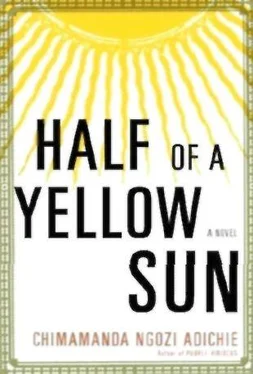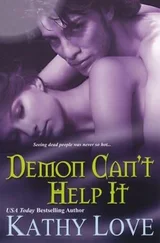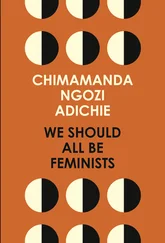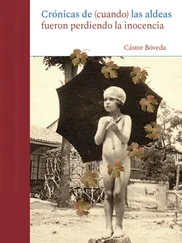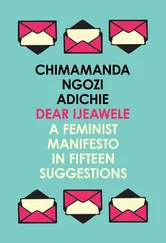"No, not all of them. My husband knows how to do, and with something like this." Olanna raised a clenched fist. They laughed and she sensed, between them, a vulgar and delicious female bond.
Olanna waited for Odenigbo to come home so that she could tell him about her new friendship with Alice, about what she had told Alice. She wanted him to come home and pull her forcefully to him in the way he had not done in a long time. But when he did come home from Tanzania Bar, it was with a gun. The double-barreled gun, long and black and dull, lay on the bed. "Gini bu ife a? What is this?" Olanna asked.
"Somebody at the directorate gave it to me. It's quite old. But it's good to have just in case."
"I don't want a gun here."
"We're fighting a war. There are guns everywhere." He slipped out of his trousers and tied a wrapper around his waist before he took his shirt off.
"I talked to Alice today."
"Alice?"
"The neighbor that plays the piano."
"Oh, yes." He was staring at the separating curtain.
"You look tired," she said. What she wanted to say was, Tou look sad. If only he was better occupied, if only he had something to do in which the moments of grief that sneaked up on him could be immersed.
"I'm fine," he said.
"I think you should go and see Ezeka. Ask him to help move you somewhere else. Even if it isn't his directorate, he must have some influence with the other directors."
Odenigbo hung his trousers on a nail in the wall.
"Did you hear me?" Olanna asked.
"I won't ask Ezeka."
She recognized his expression: He was disappointed. She had forgotten that they had high ideals. They were people of principle; they did not ask favors of highly placed friends.
"You can serve Biafra better if you work somewhere else where you can use your brain and talent," she said.
"I'm serving Biafra well enough at the Manpower Directorate."
Olanna glanced at the clutter that was their room and home-the bed, two yam tubers, and the mattress that leaned against the dirt-smeared wall, the cartons and bags piled in a corner, the kerosene stove that she took to the kitchen only when it was needed-and felt a surge of revulsion, the urge to run and run and run until she was far away from it all.
They slept with their backs turned to each other. He was gone when she woke up. She touched his side of the bed, ran her hand over it, savored the last of the rumpled warmth that lingered on the sheet. She would go and see Ezeka herself. She would ask him to do something for Odenigbo. She went outside to the bathroom, saying "Good morning" and "Did you come out well this morning?" to some neighbors as she went. Baby was with the younger children, crowded near the banana trees, listening to Papa Oji telling a story of how he shot down an enemy plane in Calabar with his pistol. The older children were sweeping the yard and singing.
Biafra, kunie, buso Nigeria agha, Anyi emelie ndi awusa, Ndi na-amaro chukwu, Tigbue fa, zogbuefa, Nwelu nwude Gowon.
When their singing stopped, Pastor Ambrose's morning prayers sounded even louder. "God bless His Excellency! God give Tanzania and Gabon strength! God destroy Nigeria and Britain and Egypt and Algeria and Russia! In the mighty name of Jesus!"
Some people shouted Amen! from their rooms. Pastor Ambrose held his Bible up, as if some solid miracle would fall on it from the sky, and shouted nonsensical words: she baba she baba she baba.
"Stop babbling, Pastor Ambrose, and go and join the army! How is your speaking-in-tongues helping our cause?" Mama Oji said. She was in front of her room with her son, his cloth-covered head bent over a steaming bowl. When he raised his head to get a breath of air, Olanna looked at the concoction of urine and oils and herbs and God knew what else that Mama Oji had decided was the cure for asthma.
"Was the night bad for him?" she asked Mama Oji.
Mama Oji shrugged. "It was bad but not too bad." She turned to her son. "Do you want me to slap you before you inhale it? Why are you letting the thing evaporate and waste?"
He bent his head over the bowl again.
"Jehovah destroy Gowon and Adekunle!" Pastor Ambrose screamed.
"Be quiet and join the army!" Mama Oji said.
Somebody shouted from one of the rooms. "Mama Oji, leave Pastor alone! First let your husband go back to the army he ran away from!"
"At least he went!" Mama Oji's retort was swift. "While your own husband lives the shivering life of a coward in the forest of Ohafia so that the soldiers will not see him."
Baby came around from behind the house; the dog trailed behind her. "Mummy Ola! Bingo can see spirits. When he barks at night it means he sees spirits."
"There are no such things as spirits, Baby," Olanna said.
"Yes, there are."
It troubled Olanna, the things Baby was picking up here. "Did Adanna tell you that?"
"No, Chukwudi told me."
"Where is Adanna?"
"She's sleeping. She's sick," Baby said, and began to shoo away the flies that circled over Bingo's head.
Mama Oji muttered, "I have been telling Mama Adanna that the child's illness is not malaria. But she keeps giving her neem medicine that does nothing for her. If nobody else will say it, then I will: What Adanna has is Harold Wilson Syndrome, ho-ha."
"Harold Wilson Syndrome?"
"Kwashiorkor. The child has kwashiorkor."
Olanna burst out laughing. She did not know they had renamed kwashiorkor after the British prime minister, but her amusement dissipated when she went to Adanna's room. Adanna was lying on a mat, her eyes half closed. Olanna touched her face with the back of a palm, to check for a fever, although she knew there would be none. She should have realized it earlier; Adanna's belly was swollen and her skin was a sickly tone, much lighter than it was only weeks ago.
"This malaria is very stubborn," Mama Adanna said.
"She has kwashiorkor," Olanna said quietly.
"Kwashiorkor," Mama Adanna repeated, and looked at Olanna with frightened eyes.
"You need to find crayfish or milk."
"Milk, kwa? From where?" Mama Adanna asked. "But we have anti-kwash nearby Mama Obike was telling me the other day. Let me go and get some."
"What?"
Anti-kwashiorkor leaves," Mama Adanna said, already on her way out.
Olanna was surprised by how quickly she hitched up her wrapper and began to wade into the bush on the other side of the road. She came back moments later holding a bunch of slender green leaves. "I will cook porridge now," she said.
Adanna needs milk," Olanna said. "Those won't cure kwashiorkor."
"Leave Mama Adanna alone. The anti-kwash leaves will work as long as she does not boil them for too long," Mama Oji said. "Besides, the relief centers have nothing. And did you not hear that all the children in Nnewi died after drinking relief milk? The vandals had poisoned it."
Olanna called Baby and took her inside and undressed her.
"Ugwu already gave me a bath," Baby said, looking puzzled.
"Yes, yes, my baby," Olanna said, examining her carefully. Her skin was still the dark color of mahogany and her hair was still black and, although she was thinner, her belly was not swollen. Olanna wished so much that the relief center was open and that Okoromadu was still there, but he had moved to Orlu after the World Council of Churches gave his job to one of the many pastors who no longer had parishes.
Mama Adanna was cooking the leaves in the kitchen. Olanna took a tin of sardines and some dried milk from the carton Ezeka sent and gave them to her. "Don't tell anybody I gave you this. Give it to Adanna little by little."
Mama Adanna grasped Olanna. "Thank you, thank you, thank you. I will not tell anybody."
But she did tell because, as Olanna left for Professor Ezeka's office later, Mama Oji called out, "My son has asthma and milk will not kill him!"
Читать дальше
